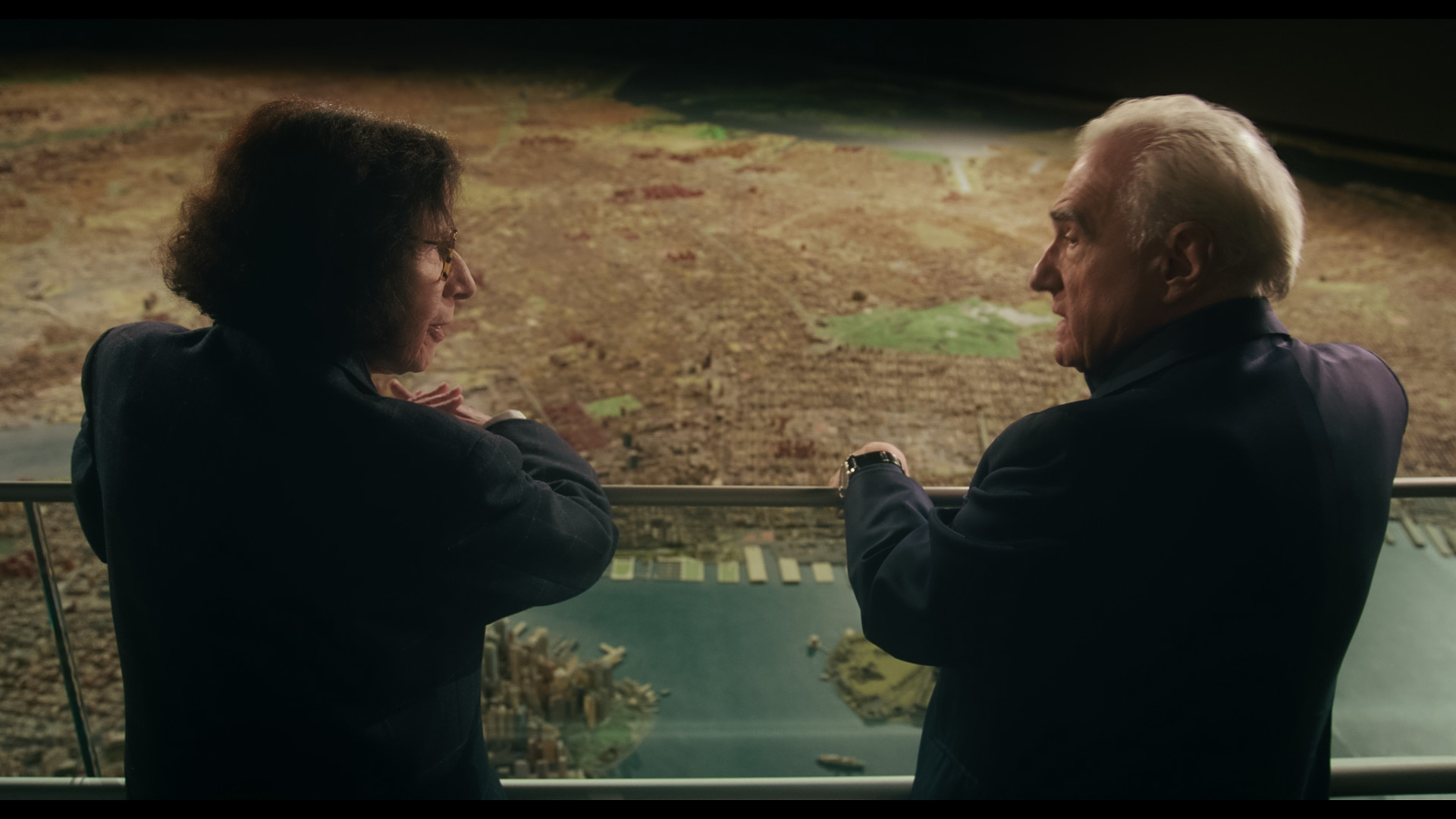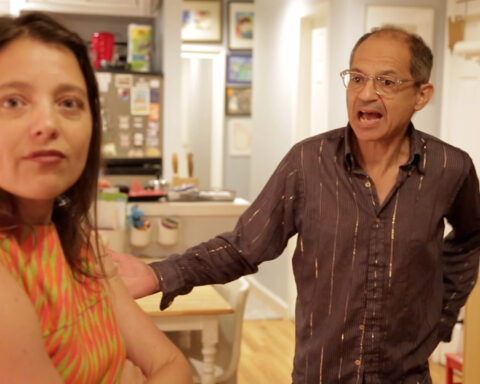Pretend It’s a City
(USA, 7 × 30 min.)
Dir. Martin Scorsese
Whenever Fran Lebowitz appears in a documentary, audiences know they’re in good hands. When Lebowitz gets the starring role in a documentary, however, audiences know they’re in for a real treat. The writer, humourist, and cultural commentator is a regular talking head in the non-fiction world. In 2019 alone, Lebowitz popped up in Killing Patient Zero, The Booksellers, Toni Morrison: The Pieces I Am, and Fiddler: A Miracle of Miracles. She’s a great talker—witty, funny, intelligent, and animated—and she seems to have a well-informed opinion about everything. Her dry, sardonic soundbites often steal the show. As the star of the seven-part Netflix series Pretend It’s a City, Lebowitz relishes the spotlight. Pair her with director Martin Scorsese, however, and the doc proves that two talking heads are even better than one.
Lebowitz reunites with Scorsese for a follow-up to their 2010 feature doc Public Speaking. One doesn’t need to have seen Public Speaking to appreciate Pretend It’s a City, since the mini-series references its predecessor enough and frequently includes footage from the film and excerpts from post-screening conversations between Lebowitz and Scorsese. Their relationship is central to this doc project, so all one really requires is a sense that these two go way back. (It’s actually a point of conversation in Pretend It’s a City.) While proximity between director and subject sometimes proves limiting in a documentary, it works wonders here. The friends are great conversationalists—although nobody can out-talk Fran Lebowitz—and are comfortable with one another to let the discussion flow in directions that only friends can navigate after years of familiarity.
Pretend It’s a City structures these conversations thematically across seven episodes. The first sees Lebowitz, a drolly-cantankerous New Yorker, gab about city life. Then she and Scorsese discuss culture and the nature of talent, then transit (no surprise: she hates it!), money (she hates that too, but loves what it buys), wellness (hates it), fun (she’s the life of every party), and books (possibly her greatest love). Besides books, Lebowitz loves one thing: smoking. Doc fans, while acknowledging the serious health risks of cigarettes, must appreciate them too. If not for her unhealthy habit, Lebowitz would lack the signature gravel to her voice that accentuates her dryly-cutting gravitas.
To note each idiosyncratic opinion or barbed observation that Lebowitz has on these topics, however, would rob audiences of the pleasure of listening to them unfold. Each story and/or rant comes with witty asides and parenthetical remarks, each of which are more laugh-out-loud funny than the next. Each episode features Lebowitz and Scorsese holding court in the New York Players Club and chatting over iced coffee. Lebowitz’s experience as a New Yorker is the lens through which the doc filters its perspective. Pretend It’s a City is a great seminar on urbanism and the joys and horrors of city life. From the smells of the subway to New York’s crowded sidewalks and exorbitantly priced apartments, the doc evokes the odorous cacophony that urban dwellers love to hate about their environments.
Scorsese foregrounds Lebowitz’s status as an iconic New Yorker with the various threads that complement the core conversations. In addition to the relatively recent archival footage from Public Speaking Q&As, the doc features some nuggets from Lebowitz’s many talk show appearances. She trades barbs with Spike Lee when asked if great athletes are in the same league as great artists. She playfully tussles with Toni Morrison at the library. She even reflects on honing her gift for gab as a cab driver upon first moving to the city, and now uses the experience to decry justifiably any cabbie who can’t find his or her way to Grand Central.
The doc inevitably features ample footage of Lebowitz walking briskly through the busy streets of New York. She always has a spark of curiosity behind her mildly perceptible scowl: as a writer, she’s an observer of the human condition, but as a New Yorker, she can’t stand the hustle-bustle of her fellow man. The film has a shrewd eye for observing the elements of city life that make Lebowitz tick, like the fitness enthusiasts scurrying by while dragging rubber tires in their wake. One can only imagine the epithets brewing in Lebowitz’s mind as she observes the spectacle of fitness while hurrying along with her day. (Like many New Yorkers, she walks as if she’s always on a mission.)
Walking frequently finds its way into Lebowitz’s anecdotes and digressions, since it’s such a central part of urban life. She loathes Times Square and, in one of the doc’s most hilarious insights, describes the horror of navigating the gaudy tourist trap when obliged to trample through it en route to a Broadway show. She gives Scorsese tips on how best to avoid the hellhole of Times Square, noting she’ll gladly take a circuitous route to circumvent all the gawking tourists with cellphones and selfie sticks.
Similarly, Scorsese lets Lebowitz walk around the city in interludes set in the scale model at the Queens Museum. The Panorama of the City of New York, built for the 1964 World’s Fair, lets Lebowitz tower over the five boroughs while giving her views on urban life. The effect of seeing Lebowitz stand grand and tall atop the city affords her status, but it also speaks to the way cities change and grow as the neighbourhoods she tours in miniature differ from those of the present-day shots in the streets. Many of the conversations between Scorsese and Lebowitz reflect on the vicissitudes of city life, noting how much louder, faster, busier, and pricier New York has become—although they’re both old and wise enough to remind viewers that the city was always loud, fast, busy, and expensive in the first place.
Pretend It’s a City adds to the growing output of Scorsese’s nostalgia factory like Rolling Thunder Revue or The Irishman as it makes sense of a changing nation through the eyes of memories of aging Americans. It doesn’t look back with rose-coloured glasses—in fact, the director and subject often laugh about the old days when doctors would give kids candy during check-ups and parents would raise their babies in clouds of cigarette smoke. The doc captures what seems like generations of change seen in one lifetime as the duo reflects on recent cultural shifts like the #MeToo movement. Lebowitz inevitably has pointed opinions about it, but she also admits that she never waited on tables because a waitressing gig in New York often entailed casting couch-style auditions. Life moves as quickly as a Manhattanite on a sidewalk and the doc captures the accelerating possibilities afforded in contemporary history, from the women’s movement to gay rights to legalised pot and trending topics.
Scorsese’s presence gradually evolves throughout the series. He plays the interviewer at first, but soon becomes a subject of the film himself when the discussion leads to art, friendship, and the changing times. When the final episode probes Lebowitz’s love for books, the friends roam the stacks of the library in search of the records that noted the arrival of Scorsese’s family in Europe. They can’t locate the Scorseses’ records among the archives and instead find an appropriate metaphor for the things that are lost as technology changes. New generations of New Yorkers fail to value print and physical things with the same passion they do and they don’t know what they’ve lost.
The relationship between Scorsese and Lebowitz is ultimately the heart of Pretend It’s a City. The doc captures the aspects of social life that make city life so grand. Viewed at home with a quarantini or two, the thoughtful laugh-a-minute exchanges between the two friends recall better days when city dwellers could gather to laugh, groan, philosophize, and mingle. It’s the most social documentary, so to speak, in recent memory. On one hand, Pretend It’s a City is an engaging portrait of Fran Lebowitz, but on the other, it’s an essential time capsule of pre-COVID city life. I haven’t laughed so heartily and consistently since 2019.
Pretend It’s a City debuts on Netflix January 8.













